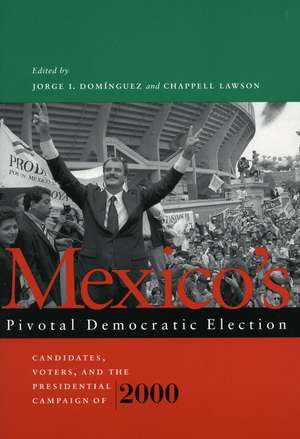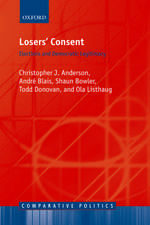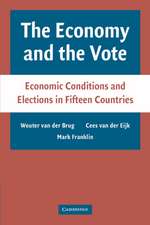Mexico’s Pivotal Democratic Election: Candidates, Voters, and the Presidential Campaign of 2000
Editat de Jorge Dominguez, Chappell Lawsonen Limba Engleză Paperback – 22 oct 2003
The 2000 Mexican presidential race culminated in the election of opposition candidate Vicente Fox and the end of seven decades of one-party rule. This book, which traces changes in public opinion and voter preferences over the course of the race, represents the most comprehensive treatment of campaigning and voting behavior in an emerging democracy. It challenges the “modest effects” paradigm of national election campaigns that has dominated scholarly research in the field.
Chapters cover authoritarian mobilization of voters, turnout patterns, electoral cleavages, party strategies, television news coverage, candidate debates, negative campaigning, strategic voting, issue-based voting, and the role of the 2000 election in Mexico's political transition. Theoretically-oriented introductory and concluding chapters situate Mexico's 2000 election in the larger context of Mexican politics and of cross-national research on campaigns. Collectively, these contributions provide crucial insights into Mexico's new politics, with important implications for elections in other countries.
Chapters cover authoritarian mobilization of voters, turnout patterns, electoral cleavages, party strategies, television news coverage, candidate debates, negative campaigning, strategic voting, issue-based voting, and the role of the 2000 election in Mexico's political transition. Theoretically-oriented introductory and concluding chapters situate Mexico's 2000 election in the larger context of Mexican politics and of cross-national research on campaigns. Collectively, these contributions provide crucial insights into Mexico's new politics, with important implications for elections in other countries.
| Toate formatele și edițiile | Preț | Express |
|---|---|---|
| Paperback (1) | 297.27 lei 3-5 săpt. | |
| Stanford University Press – 22 oct 2003 | 297.27 lei 3-5 săpt. | |
| Hardback (1) | 997.25 lei 6-8 săpt. | |
| Stanford University Press – 22 oct 2003 | 997.25 lei 6-8 săpt. |
Preț: 297.27 lei
Nou
Puncte Express: 446
Preț estimativ în valută:
56.88€ • 60.83$ • 47.43£
56.88€ • 60.83$ • 47.43£
Carte disponibilă
Livrare economică 27 martie-10 aprilie
Preluare comenzi: 021 569.72.76
Specificații
ISBN-13: 9780804749749
ISBN-10: 0804749744
Pagini: 392
Dimensiuni: 152 x 229 x 25 mm
Greutate: 0.54 kg
Ediția:1
Editura: Stanford University Press
Colecția Stanford University Press
ISBN-10: 0804749744
Pagini: 392
Dimensiuni: 152 x 229 x 25 mm
Greutate: 0.54 kg
Ediția:1
Editura: Stanford University Press
Colecția Stanford University Press
Recenzii
"Dominguez and Lawson's book fills an important gap in the systematic, analytical, empirical, and theoretical study of Mexican electoral politics."—Latin American Politics and Society
"A major effort at analyzing the pivotal Mexican presidential elections of July 2000, using best practices derived from American electoral studies. This book will serve as a benchmark for subsequent studies within Mexico, and for comparative international studies." —Laurence Whitehead,Director, Centre for Mexican Studies, Oxford University
Notă biografică
Jorge I. Domínguez is the Director of the Weatherhead Center for International Affairs at Harvard University. Chappell H. Lawson is Associate Professor of Political Science at MIT.
Textul de pe ultima copertă
“Dominguez and Lawson’s book fills an important gap in the systematic, analytical, empirical, and theoretical study of Mexican electoral politics.”—Latin American Politics and Society
“A major effort at analyzing the pivotal Mexican presidential elections of July 2000, using best practices derived from American electoral studies. This book will serve as a benchmark for subsequent studies within Mexico, and for comparative international studies.” —Laurence Whitehead,Director, Centre for Mexican Studies, Oxford University
“A major effort at analyzing the pivotal Mexican presidential elections of July 2000, using best practices derived from American electoral studies. This book will serve as a benchmark for subsequent studies within Mexico, and for comparative international studies.” —Laurence Whitehead,Director, Centre for Mexican Studies, Oxford University

















